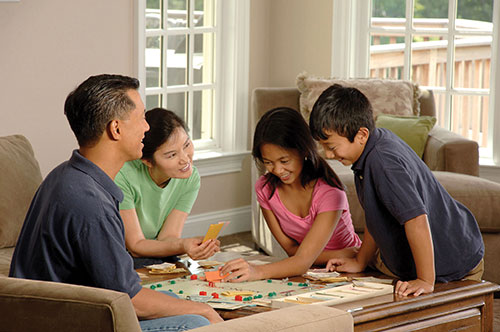Spending Quality Family Time Together
 As a parent, you do everything you can to give your children a good life. You work to provide them with a safe, comfortable home, clothing, healthy meals, school supplies and opportunities to enjoy fun activities and pastimes.
As a parent, you do everything you can to give your children a good life. You work to provide them with a safe, comfortable home, clothing, healthy meals, school supplies and opportunities to enjoy fun activities and pastimes.
While meeting these physical needs is important and a family priority, spending quality time with your children may be the single most critical thing you can do to ensure their healthy emotional development and growth. Time spent together means opportunities for you to teach, for your children to learn and for both of you to strengthen your loving, nurturing relationship. By being around you, your children develop their self-esteem and a sense of belonging, and have experiences they will remember and cherish all their lives.
From teaching your children manners and common courtesies like saying “Please" and “Thank you" to letting them know that they are loved unconditionally, spending time together helps everyone stay connected as a family. And there are other practical benefits, like making weekly schedules, reaching decisions that affect every family member and staying up-to-date on what is happening in everyone's life.
Suggestions for Spending Time Together
Any time spent together is good, but the most effective time together is meaningful time. This means time without distractions like TV and taking part in activities that more than one person will enjoy. It also includes sincere conversations and genuine praise.
 Here are some tips for establishing a fun, frequent and meaningful family time routine:
Here are some tips for establishing a fun, frequent and meaningful family time routine:
-
Set aside one day a week when the whole family does something special together.
-
Plan special gatherings with grandparents and other relatives.
-
Have regular family meetings where everyone has a chance to participate.
-
Sit down as a family as often as possible to eat a meal and discuss your day. For added fun, invite your children to plan, shop and cook with you, or make a dessert together.
-
Support your children by doing things such as coaching Little League or helping in the classroom.
-
Encourage your children to share and express their feelings and to talk about both the happy and sad events in their lives.
-
Establish new traditions with your kids. They don't have to be elaborate, and can fit into your already established weekly routine, such as mealtimes, bedtime or weekend errands.
Additional Resources
-
Help! There's a Toddler in the House! by Thomas M. Reimers, Ph.D.
-
I Brake for Meltdowns: How to Handle the Most Exasperating Behavior of Your 2- To 5-Year-Old by Michelle Nicholasen and Barbara O'Neal
-
Parenting the Strong-Willed Child: The Clinically Proven Five-Week Program for Parents of Two- to Six-Year-Olds by Rex Forehand and Nicholas Long
Download Printable Version
Kid Tips;Family and Parenting
